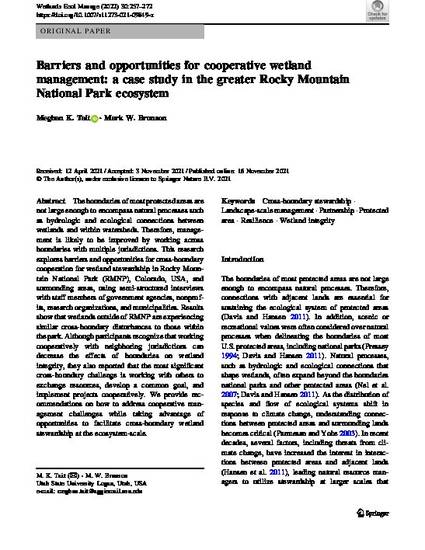
Article
Barriers and opportunities for cooperative wetland management: a case study in the greater Rocky Mountain National Park ecosystem
Wetlands Ecology and Management
(2022)
Abstract
The boundaries of most protected areas are not large enough to encompass natural processes such as hydrologic and ecological connections between wetlands and within watersheds. Therefore, management is likely to be improved by working across boundaries with multiple jurisdictions. This research explores barriers and opportunities for cross-boundary cooperation for wetland stewardship in Rocky Mountain National Park (RMNP), Colorado, USA, and surrounding areas, using semi-structured interviews with staff members of government agencies, nonprofits, research organizations, and municipalities. Results show that wetlands outside of RMNP are experiencing similar cross-boundary disturbances to those within the park. Although participants recognize that working cooperatively with neighboring jurisdictions can decrease the effects of boundaries on wetland integrity, they also reported that the most significant cross-boundary challenge is working with others to exchange resources, develop a common goal, and implement projects cooperatively. We provide recommendations on how to address cooperative management challenges while taking advantage of opportunities to facilitate cross-boundary wetland stewardship at the ecosystem-scale.
Disciplines
Publication Date
2022
DOI
https://doi.org/10.1007/s11273-021-09849-x
Citation Information
Mark W. Brunson. "Barriers and opportunities for cooperative wetland management: a case study in the greater Rocky Mountain National Park ecosystem" Wetlands Ecology and Management Vol. 30 (2022) p. 257 - 272 Available at: http://works.bepress.com/mark_brunson/301/
